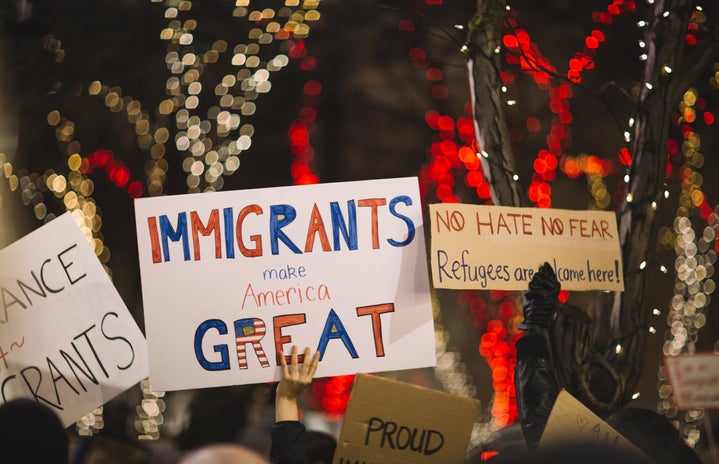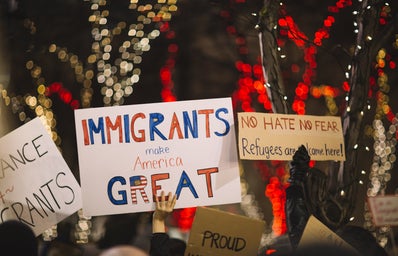For my first article of “The Learning Curve,” I discussed sexism in pre-health education and in medicine with a pre-med peer of mine in the Women’s and Gender Studies undergraduate program at Saint Louis University.
For the second piece in this series, I sat down with Lejla Bukvic, another peer of mine. Lejla introduces herself exactly as she wants to be introduced, so enjoy the interview in which we talk about her Bosniak identity, the law, research, and bias.
Annie: Alright so it’s March 3rd and it is also Super Tuesday across the United States. And this will probably be a couple of weeks before this article is published, however, before election results are in and before we know everything and we probably get pretty sad. We were just talking that we both think that the primary and the actual election are probably going to be pretty sour for the county, the Democrats, the left. I’m here today with Lejla Bukvic; how do you find hope? How do you energize yourself? Who are you? What’s your story?
Lejla: Alright let’s start with who I am I guess and then we can move to the election. So I am a young woman, an undergraduate student at SLU, I’m Bosnian, I grew up Muslim. I am a little less Muslim now, a lotta’ less Muslim now. But I mean my family’s still Muslim, I’m culturally Muslim. I’m a Gender Studies major and an English major. I’m a sister, like an actual one and not a sorority one. I was one but that’s over. I’m a feminist.
A: It’s interesting that you finished with that one. Why was that one last?
L: I think it gives a punch at the end. Like i’m all of these things but they are all influenced by that last one. Like I’m a sister but I’m a sister in a feminist way. I’m a daughter but I’m a daughter in a feminist way. I’m a Muslim but I’m a Muslim feminist. I think it will make you think about the rest of my identities if you end on that one.
But then, I don’t know, the election! That’s like a big swing!
A: It is a pretty big swing! You were just mentioning that you’ve donated to a bunch of democratic campaigns throughout the last couple months and now like a lot of the people you were supporting with your money, which is a pretty big deal, have dropped out, some within the last few days. Which sucks! Yeah. So, as a woman who identifies as a Muslim from Bosnia, how does this election engage with your identiies?
L: I guess I would say I’m not as upset that people are dropping out or maybe my first choice isn’t gonna make it. My first choice is not Joe Biden. But if it’s him it’s him, right? Like I come from a place where we have three presidents and they all take turns being the president. There’s a lot of underlying nationalism in my country. There’s a lot of underlying nationalism here but no one seems to really notice it. They equate it to being patriotic but patriotism and nationalism are two very different things, but there is a fine line. But at least in my home country the president takes turns. And here it’s like this one might not, he might stay in office. And even if, let’s say the Democrats do win the election, he could say, “No, that’s a hoax, I’m staying.” That’s what I’m super worried about.
I think a lot of Americans don’t think that’s a possibility.
A: We trust the process.
L: You really trust the process. I’ve seen the process completely diminished and crumble in my country. It still doesn’t work properly and it’s really hard to come back from something like that, seeing the process crumble in front of your eyes. Because trust is completely gone. Despite the fact of what’s going on in America, Americans still find trust in one another. Like I trust the person next to me despite the fact that they may or may not be a Trump supporter to still respect my rights as a person. They might not agree with my views but they won’t kill me for them.
Whereas over there in my country they might. And they do. So I’m still grateful that there is still a process here. But I’m much more skeptical than your Average Joe.
A: So since I did not plan for this at all let’s keep with the legal route. So you’re a WGS (Women’s and Gender Studies) major and an English major. You have experience working as a paralegal for an attorney. You’ve mentioned in class that you want to go to law school. Tell me about what drives you in the morning? What is the law to you? Especially in the U.S. as a Bosnian woman? How do you engage with American political thought and with your own?
L: I think a lot of people think the law is very invisibile. A lot of times, that might be true. A lot of cases, people cannot physically hold or see the law in their hands. But I feel like you can see where the law plays a big role in your everyday life if you go to a different country where the laws are not taken seriously.
So like in my country there are laws, absolutely. But a lot of people don’t follow them and a lot doesn’t get done about it. Or there are places that are so remote, so far off the grid, there is no law. It doesn’t exist there because law takes a community and it takes a group of people in order for it to work. And if there are no people around there really are no consequences. That’s where the law is present, it’s in consequence. Like “justice exists in this form because we defined it this way and if this goes wrong in this way according to this law then there are consequences for it.”
But that’s not a thing in my country anymore. For example when I went to study abroad in 2016, prior to Trump’s election, I got on the tram in Sarajevo and I was speaking English even though I’m Bosnian. I was speaking in English because one of the students who was also studying abroad only spoke English. So I started speaking English with her on the tram. And I got picked off the tram by the patrol, or the people that patrol the trams that make sure you pay for your ticket. And I got plucked off and so did my American counterpart and no one else did. Because we were American. The law did not apply to us as correctly as an average citizen or someone who spoke the language and could understand what was happening. The consequences were very different for her and me.
So they said “you’re Americans you didn’t pay for the tram. Cough up some Euro or some Mark and we’ll let you go.” But then I started speaking Bosnian and they were like “oh my god, I took one of my own people, I shouldn’t have done that.” You know? So the laws apply differently to different people and usually its based upon your identity. So if I was speaking on Ekavski instead of Ijekavski, which is a different dialect over there in Sarajevo, I would have still been picked off because that would be a clue that I was Croatian or Serbian and not Bosniak or Muslim.
And so they still might have picked me off because they are focusing on your identity. So it’s not really about the law, you know? It’s about who you are at this moment and if I can take advantage of you.
A: And you can see this in the U.S. so clearly as well?
L: I think in certain circumstances, absolutely. I think it has more to do with race and I think it has more to do with sexual orientation. People get picked off for those reasons or they get shamed or they face very big consequences just for being black or being gay in public outwardly.
A: Earlier you brought up how people kind of act as a social control system to keep peace. I feel like so much of that is social pressure and norms through community. Which is so interesting because you’re literally studying this for your capstone in Women’s and Gender Studies. For this project, you’re sitting in on these Coffee Talks with Bosniak women in St. Louis. How is this research going?
L: I was telling people in class earlier that what I have learned from the women I have interviewed is that I’m constantly surprised by the things that they say or that they have questions for me. They’re so interested in my research. I wasn’t expecting that, and why I wasn’t expecting that was because of some bias in my head.
A: So what was your bias?
L: I read so many articles about the tragic Bosniak woman, this tragic Muslim woman who has been ravaged by war. Like “oh, how sad!” and she’s just now going to take care of her family and that’s who she is. But that’s not who she is, you know? She’s not this quiet, meek, tragic person, or woman. And I should know better than that because that’s like me thinking about myself, or my mom, or my aunts like that. That’s not who they are. And I know that. But it’s this unconscious bias that I have from reading about my people through Westernized media.
A: So you’ve been enculturated into these biases because of the way that Americans write about…
L: The way Western academics write their research papers.
A: Holy crap.
L: And at least I was conscious enough to realize that that’s what was happening!
A: Yeah, thank god.
L: Thank god I picked that up. Credit that to WGS! So the stuff they tell me, I’m so surprised. And why? It’s because of these things that I’ve read about you. But they’re not about you, they’re about the American researcher who sees you this way.
A: Oh my god I have eight trillion things I want to ask you about. So you graduate in like eight weeks-ish-
L: Oh my god don’t say that. Fingers crossed!
A: So, what’s next? What are your goals?
L: After I graduate I’m gonna take a year off. I wanted to work and to figure some things out and get some things in order. Figure out if I want to have a baby or not. Or like when to have one? Like I want to have hard conversations before I go to law school.
A: With your partner, yeah.
L: Because once I get in there, that’s like three or four if I do a masters program with it for law school. These are four years that are gonna be very structured and there are gonna be expectations I have to meet and tests I have to take to make sure I obtain this degree and this job and am finally secure. And so I can rely on just my own income. Right now, it’s a lot of pressure. I feel like I have to make a lot of decisions very quickly, and a year is not a lot of time. Especially when you’re married. So there are big things that are coming up and you have to do them right away or like assignments due. It’s a whole different world.
So you go home and it’s like you and your partner and domestic matters, private matters. You go into your classroom and it’s like “okay there are like so many other expectations of me and these assignments and deadlines I have to meet.” And it’s all at once at the same time. So there’s not really a separation but in your mind you have to make one.
A: Wave two feminism says that there is a break, but there isn’t.
L: Well they say the personal is political. And I agree with that. So unless i made this divide in my head, I will lose it. I would be constantly tired and exhausted. And I already feel like that because I can’t turn my feminism off! It’s always there.
A: Undergrad is so interesting because of how much everyone is juggling all the time, at all hours of the day, your brain is in eight places at once. So. What has been your favorite part of your WGS experience at SLU? How do you think you’ve grown?
L: My favorite part is always the students I meet in class, which become my other fam. Those are my peeps, you know? Those are my people! It’s not so much they’re my peers, they’re my friends. And that’s so beautiful because you have so much in common with these people, and even if you disagree you can always come back to these core common values you have. You can still respectfully disagree with them, and you can talk to them and talk through things with them. And it’s totally fine.
Whereas, I don’t feel like I have that with other departments. I don’t feel like I can have a disagreement with a student in my English class and have it be okay afterwards. There’s no way. We cannot disagree, we’re gonna have a vengeance for each other or we’re gonna start competing in class. Whereas here, I don’t feel like that with the students in the class.
A: For the listeners for this audio file, we just got out of a three hour seminar course. And I’m sure you just got out of a billion classes today, and so did I.
I don’t know, you are so in tune with what is going on. You see people with the most kind lens. I really appreciate that you’re here talking with me today. You guys in Womens and Gender Studies, you guys are my closest friends now. It’s so phenomenal to share this space with you and that I can give you such a sh*tty interview but it will be fine and we’ll hang out tomorrow.
L: I think it’s a great interview!
A: Thank you, I appreciate it!
L: You’re just like, *claps* let’s do it! We did it!
A: Thanks, Lejla!



